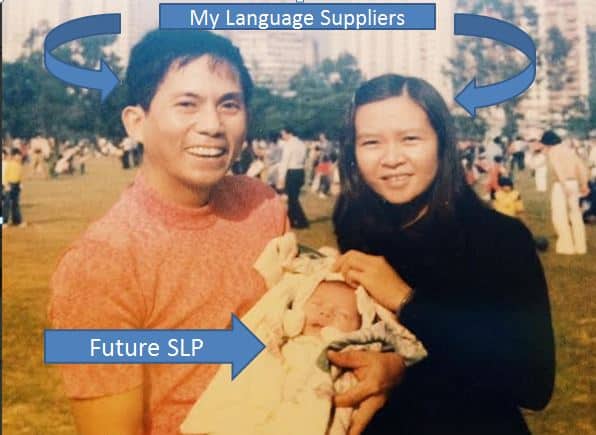 I can speak two languages. People have told me how lucky I am for being bilingual.
I can speak two languages. People have told me how lucky I am for being bilingual.
Silent Period
1. I am not sure I uttered more than 100 words my entire kindergarten year. I would seesaw with Becky during recess, and I just remember seeing her mouth moving and smiling. The words made no sense. The childish grin, however, spoke volumes.
The first year of being introduced to one’s second language is referred to as “the silent period,” an unwillingness or inability to orally communicate. This is a normal phenomenon, and I surely played my silent role. With my chosen profession, I have definitely made up for the quietness in my early educational years.
Interpreter, I am.
2. Starting at the age of 6, I became my parents’ interpreter. I would interpret at Eckerd’s, school, Richardson Square Mall when ordering an Orange Julius – wherever and whenever needed. As a child, I was resentful. As a teenager, I was annoyed. As an adult, I am grateful I was able to assist them in communicating their needs, wants and requests. Again, I have a better understanding of why my heart chose our awesome profession.
Being Bilingual = Let me help
3. As a bilingual speech-language pathologist, I do not have the words to describe helping Vietnamese families and children. When parents walk into a meeting and see me, I see the angst leave their faces. I have been in a meeting when the mother would tightly hold my hand and tell me, “Xin giúp tôi nói chuyện.” “Please help me communicate to them.” I have had the parent of a fourth grader cry after the end of a meeting. She stated that it was the first time in her son’s academic career where she felt like someone understood her. I interpret at meetings, and I do assessments in Vietnamese. It is a part of my job. However, each time I assist a child or family, I feel like I am making my parents proud. I am able to help and give back to people who lived my parents’ lives. This feels good.
The More Languages, the Merrier
4. Because I am bilingual, I understand, twofold, the beauty of each individual language. One of my greatest joys is standing in a highly dense, urban area and hearing the various languages, words and dialects swimming around me. There are sounds I admire and cannot produce. There are words I am confident I understand by the mere companion gestures.
Words are Overrated
5. I also see how people are able to transcend the barriers of language to still communicate their intent. There’s a lot to be said for a smile or a helping hand.



Thank you for your wonderful presentation at TSHA about intensive speech remediation and your collaboration with Jarrell ISD.
Hello, I am looking for more information about the Jarrell Elementary program with intensive speech services. I would like to present this option to my colleagues as possible model for the fall. The links on your other article are no longer available.
Hi Tamara,
We wrote an online course about Intensive Delivery Models to share examples and more detailed information on how to make it happen in your school: Intensive Speech-Language Therapy Model: How Am I Going to Do That?. It has huge benefits but also takes a bit for a district to wrap their mind around if it is new. The research that is shared in the course is really helpful. We have also found that it is easier to start with portions of a caseload, such as Speech-Only. Specific disorder groups like Life Skills or Autism may still benefit from a traditional model.
P.S., You did Mary Jo proud! 🙂
Keep your posts coming, they are full of interesting insights, and a great resource.
I also wonder if you can direct me to parent resources.
I work with preschoolers and their families who speak a variety of Asian langauges and who have been advised to only speak English to their child during 0-3 services and now would like to begin to speak their home langauge to their child. For example, today a mother whose L1 is Korean and is a University professor, asked “since Korean has such a different sentence structure than English, will it make it more challenging for my son to learn English if I begin to speak Korean to him now”.
What are your thoughts in general?
I would like to have some resources for these families which can help them navigate this decision.
I have a wonderful resource from Minnesota Speech and Hearing Assoc., but wonder if you have any others.
Mary,
Thank you so much for your important and thoughtful question. This topic surfaces frequently. First, it is important for second language learners to have full exposure to their native language. This builds a solid language foundation to support second language acquisition. In this case, introducing a second language will not hinder the learning of the child’s acquisition of English. As a second language learner myself, I also feel that there are important benefits to keeping one’s native language.
1. Our demographics are quickly changing in our nation, and being bilingual is an important and meaningful skill.
2. Being able to speak the family’s native language supports cultural gain. For example, as a native speaker, I gain more insight into my culture and familial background as a Vietnamese speaker.
Mary, an important part of your question relates to the the need for better education. Advising parents to speak English to their children during 0-3 services does not support the research regarding bilingualism and second language acquisition. Moreover, making such a request could potentially impact the family’s cultural needs and comfort. This past year, I met two Vietnamese families. Both families had school-aged children receiving speech and language services in the schools. Both families reported they were informed to only speak English to their children at home. The parents expressed discomfort with the recommendation; however, they followed through with the suggestion in order to “make it better and easier” for their sons to acquire English. The parents also expressed sadness regarding their children’s inability to communicate with them in Vietnamese.
As service providers and educators, we all need to understand the full scope of second language acquisition. We also need to understand the huge value of preserving one’s culture. Below are a few resources for you from ASHA:
1. Speech Development Bilingual Children
2. Speech Development Second
Again, thank you for your input and question. Please let me know if I can help support you in any way. I can be reached at phuong.palafox@bilinguistics. com. Thanks.
Phuong
Oh, how I wish I was bilingual. Since I was not blessed with that skill, I will just keep wonderful articles like this and all of my bilingual SLP friends as close resources to help. Serving Vietnamese families (and Laotian and Hispanic) has enriched my career beyond words.
Thanks Phuong and the Bilinguistics team for these amazing posts.
Gina, thank you so much for your thoughtful comment. We are passionate about our profession, and we are grateful to have the opportunity to support our families in such a meaningful way. And, I agree with you whole-heartedly–our lives are so enriched by those we serve. Aren’t we the lucky, lucky ones?